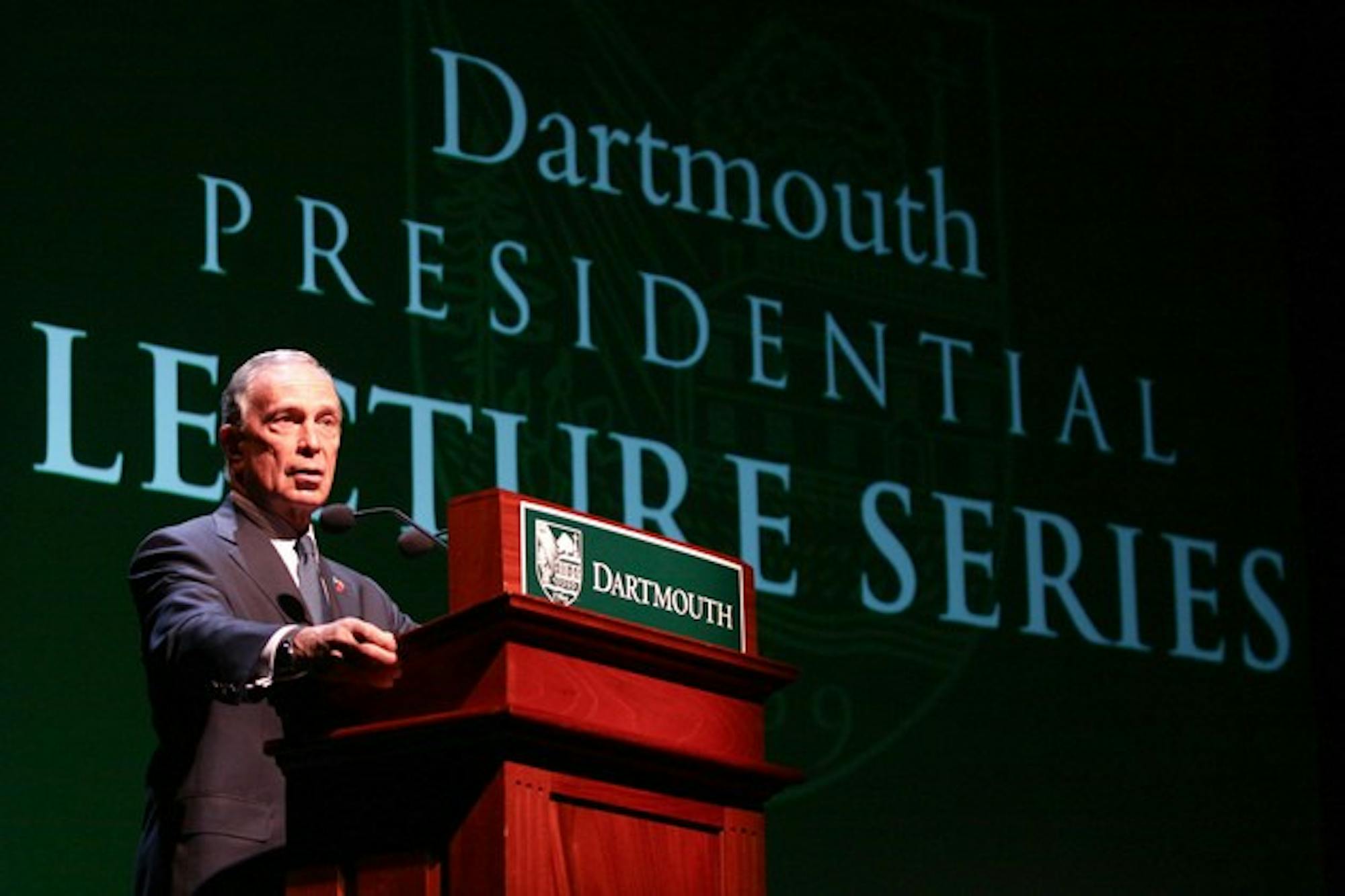Bloomberg who was accompanied by longtime girlfriend and current member of the College's Board of Trustees Diana Taylor '77 urged students to consider different perspectives and to strive for "common sense, common ground solutions."
The lecture which was initiated by Kim as an effort to reinstate former College President John Sloan Dickey's "Great Issues" course was established to "promote discussion of current global issues and supplement [students'] classroom experience with real life lessons on invocation, collaboration and leadership," Kim said during his introduction for Bloomberg.
"One of the things that never ceases to amaze me is how many people in government are willing to accept conventional wisdom without asking the right questions," Bloomberg said. "Never make the mistake of thinking that any political party has the monopoly on ethics or good ideas."
Bloomberg is currently registered as an Independent, but has previously been a member of both the Republican and Democratic parties. He originally ran for mayor as a Republican, but became an Independent in 2007.
Immigration and public education are two of the most vital issues America faces today, Bloomberg said, adding that inefficiency in Congress and politicians' unwillingness to confront these problems have prevented the adoption of viable policy solutions in Washington, D.C.
"We [should] pass a law that will let anybody come to this country if they're willing to start a small business and employ 10 Americans," Bloomberg said.
Students should never "play it safe," but instead must take big risks yield big results, according to Bloomberg.
"The conventional wisdom [in politics] is to try to keep everyone happy," he said. "That's never been the approach that I have taken. I believe if you take on controversial issues, people will respect you for it in the long run."
Although Bloomberg's 2002 Smoke-Free Air Act which banned smoking in public buildings in New York City was unpopular and highly criticized upon its passage, Bloomberg cited it as a landmark decision that allowed for future innovations.
"Shortly thereafter, Europe followed, and many big cities in America followed," Bloomberg said. "By doing what was right, it turned out that people loved it, and that allowed us to take on other public policy issues."
During the question and answer session, however, Bloomberg refuted the claim that he is considering running for president of the United States in 2012.
"Arguably being the mayor of New York is the best political job in the world," he said. "We have our own foreign policy, I've got the eighth biggest army in the NYPD, we've got a budget that's bigger than most countries' GNP."
Bloomberg recounted another formative experience in his professional life being fired from his first job at Salomon Brothers in 1981. Although Bloomberg said people thought he was "crazy" at the time, he took a risk and founded Bloomberg L.P. the financial news and data company through which he became successful the next day.
In the speech, Bloomberg also encouraged students to volunteer in their local communities and around the world, citing New York programs such as NYC Service and Cities of Service that work to "answer [President Barack Obama's] call for a new era of service," he said.
"Not only will it put a smile on your face, [but service] is great for meeting people," Bloomberg said. "When you get out into the business world, one of the things you will find is a great deal of the networks and contacts that you make are built around philanthropy. In New York City, it's the major thing that pulls people together."
In order to face the world's issues, students should also focus on how to interact with people to approach problems, Bloomberg said.
"The truth of the matter is you don't know what opportunities will be presented to you," he said. "You don't know where you will succeed and where you will fail."
In response to a question from Kim during the question and answer session after the lecture, Bloomberg discussed the "habits of the mind" that led to his successes in finance and public service. The engineering program at his alma mater, Johns Hopkins University, taught Bloomberg to constantly challenge convention, he said.
"In science, you have to be able to look in a mirror and answer the question," Bloomberg said. "You can't just say something and believe it. You have to show you're right. That discipline of not just taking people's word for it, or not just following what's generally accepted, has forced me to step back and say, Why?'"
In the question and answer session, Bloomberg advocated for expanded executive powers in administrative leadership.
"The President [of the United States] can impose, the President can cajole, the President can influence," Bloomberg said. "But it's Congress that writes the legislation. The public's safeguard is every four years at the ballot box."
Following a question that he joked was submitted by Taylor, Bloomberg denied the possibility that he would run for President in 2012.
"I'm gainfully employed," Bloomberg said. "I've made a commitment [to serving as mayor] for the next 1,263 days."




